Bibliography
- Diffie, Bailey Wallys; Shafer, Boyd C.; Winius, George Davison (1977), Foundations of the Portuguese Empire, 1415–1580, U of Minnesota Press, ISBN 9780816607822
Bacalao, Bacallao, or Terra do Bacalhau was a phantom island depicted on several early 16th century Portuguese maps and nautical charts. The name is a variation of bacalhau, meaning "cod" or "stockfish".
According to Gaspar Frutuoso in his work Saudades da Terra, written in the 1570s, a joint crew of Didrik Pining, John Scolvus, Hans Pothorst, Álvaro Martins, and João Vaz Corte-Real in 1472 was granted lands in the Azores by the king of Portugal, because of his discovery of the Terras do Bacalhau. Historians do not consider the work of Frutuoso as very reliable, as it contains a great deal of misinformation. [1]
Off the northwest tip of Newfoundland's Avalon Peninsula is an island named Bacalaos, known to Europeans by that name since at least 1556, when it was drawn on the Gastaldi map as "Bacalaos". [2]

Portuguese colonization of the Americas constituted territories in the Americas belonging to the Kingdom of Portugal. Portugal was the leading country in the European exploration of the world in the 15th century. The Treaty of Tordesillas in 1494 divided the Earth outside Europe into Castilian and Portuguese global territorial hemispheres for exclusive conquest and colonization. Portugal colonized parts of South America, but also made some unsuccessful attempts to colonize North America.

Pedro Álvares Cabral was a Portuguese nobleman, military commander, navigator and explorer regarded as the European discoverer of Brazil. He was the first recorded human in history to ever be on four continents, uniting all of them in his famous voyage of 1500, where he also conducted the first substantial exploration of the northeast coast of South America and claimed it for Portugal. While details of Cabral's early life remain unclear, it is known that he came from a minor noble family and received a good education. He was appointed to head an expedition to India in 1500, following Vasco da Gama's newly opened route around Africa. The undertaking had the aim of returning with valuable spices and of establishing trade relations in India—bypassing the monopoly on the spice trade then in the hands of Arab, Turkish and Italian merchants. Although the previous expedition of Vasco da Gama to India, on its sea route, had recorded signs of land west of the southern Atlantic Ocean, Cabral led the first known expedition to have touched four continents: Europe, Africa, America, and Asia.

Bacalhau is the Portuguese word for cod and—in a culinary context—dried and salted cod. Fresh (unsalted) cod is referred to as bacalhau fresco.
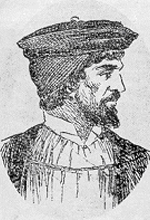
João Vaz Corte-Real was a Portuguese sailor, claimed by some accounts to have been an explorer of a land called Terra Nova do Bacalhau, speculated to possibly have been a part of North America. These accounts assert that Corte-Real was awarded the donatário–captaincies of São Jorge and Angra for his accomplishments, but contemporary documents contradict this claim.

Pedro Escobar, also known as Pero Escobar, was a 15th-century Portuguese navigator who discovered São Tomé, Annobón, Príncipe islands, together with João de Santarém c. 1470. He is then recorded sailing with Diogo Cão on his first voyage in 1482, and as the pilot of the famous Bérrio caravel on Vasco da Gama's first expedition in 1497 to sail directly from Europe to India. He was also on Pedro Álvares Cabral's discovery of Brazil in 1500.

Duarte Pacheco Pereira, called the Portuguese Achilles by the poet Camões, was a Portuguese sea captain, soldier, explorer and cartographer. He travelled particularly in the central Atlantic Ocean west of the Cape Verde islands, along the coast of West Africa and to India. His accomplishments in strategic warfare, exploration, mathematics and astronomy were of an exceptional level.
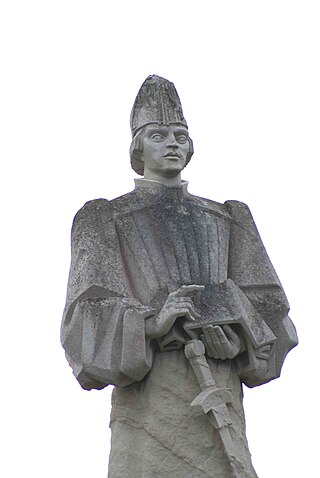
Álvaro Martins, also known as Álvaro Martins Homem, was a 15th-century Portuguese explorer alleged to have explored the western Atlantic and later the African coast. He is claimed to have accompanied João Vaz Corte-Real on an undocumented expedition to Terra Nova do Bacalhau in the early 1470s, by Gaspar Frutuoso in his 1570s book Saudades da Terra.

Nicolau Coelho was an expert Portuguese navigator and explorer during the Age of Discovery. He participated in the discovery of the route to India by Vasco da Gama where he commanded Berrio, the first caravel to return; was captain of a ship in the fleet headed by Pedro Álvares Cabral who landed in Brazil. He died at sea, possibly off the coast of Mozambique, while returning from India in the 5th Portuguese Armada with Francisco de Albuquerque.
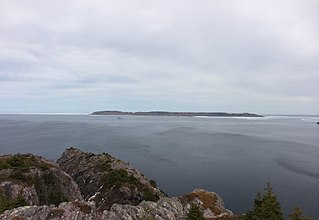
Baccalieu Island or Bacalhoo Island is a 5 km2 uninhabited island at the northern extremities of Conception Bay in Subdivision 1G, near the community of Red Head Cove, Newfoundland and Labrador, Canada. It is separated from the island of Newfoundland by Baccalieu Tickle, a small strait and an abundant fishing ground. The island has some trees but is mostly rocky.
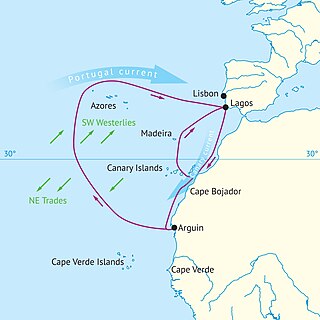
Volta do mar, volta do mar largo, or volta do largo is a navigational technique perfected by Portuguese navigators during the Age of Discovery in the late fifteenth century, using the dependable phenomenon of the great permanent wind circle, the North Atlantic Gyre. This was a major step in the history of navigation, when an understanding of winds in the age of sail was crucial to success: the European sea empires would not have been established without an understanding of the trade winds.

Fresh fish rapidly deteriorates unless some way can be found to preserve it. Drying is a method of food preservation that works by removing water from the food, which inhibits the growth of microorganisms. Open air drying using sun and wind has been practiced since ancient times to preserve food. Water is usually removed by evaporation but, in the case of freeze-drying, food is first frozen and then the water is removed by sublimation. Bacteria, yeasts and molds need the water in the food to grow, and drying effectively prevents them from surviving in the food.

Dried and salted cod, sometimes referred to as salt cod or saltfish or salt dolly, is cod which has been preserved by drying after salting. Cod which has been dried without the addition of salt is stockfish. Salt cod was long a major export of the North Atlantic region, and has become an ingredient of many cuisines around the Atlantic and in the Mediterranean.
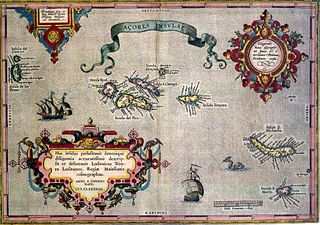
The following article describes the history of the Azores, an archipelago composed of nine volcanic islands in the Macaronesia region of the North Atlantic Ocean, about 1,400 km (870 mi) west of Lisbon, about 1,500 km (930 mi) northwest of Morocco, and about 1,930 km (1,200 mi) southeast of Newfoundland, Canada.
João de Trasto is the name sometimes given to an obscure Portuguese mariner, who is alleged to have captained the first exploratory expedition dispatched by Prince Henry the Navigator in 1415.
João Afonso do Estreito, from Funchal, Madeira, was a partner and co-captain in the Dulmo-Estreito expedition of 1487, a proposed pre-Columbian voyage of exploration across the Atlantic. Although licensed by King João II of Portugal, there is no evidence that the voyage ever took place.

Gaspar Frutuoso was a Portuguese priest, historian and humanist from the island of São Miguel, in the Portuguese archipelago of the Azores. His major contribution to Portuguese history was his detailed descriptions of the history and geography of the Azores, Madeira, Canary Islands and references to Cape Verde, which he published in his six-part tome Saudades da Terra, as well as Saudades do Céu. He is normally cited in settlement history of the islands of the Azores.

The Portuguese conquest of Asilah in modern Morocco from the Wattasids took place on 24 August 1471.

The Battle of Guinea took place on the Gulf of Guinea, in western Africa, 1478, between a Portuguese fleet and a Castilian fleet in the context of the War of the Castilian Succession.
Gonçalo de Sintra or de Cintra (d.1444/45), was a 15th-century Portuguese explorer and servant of Prince Henry the Navigator.
Bacalao may refer to: